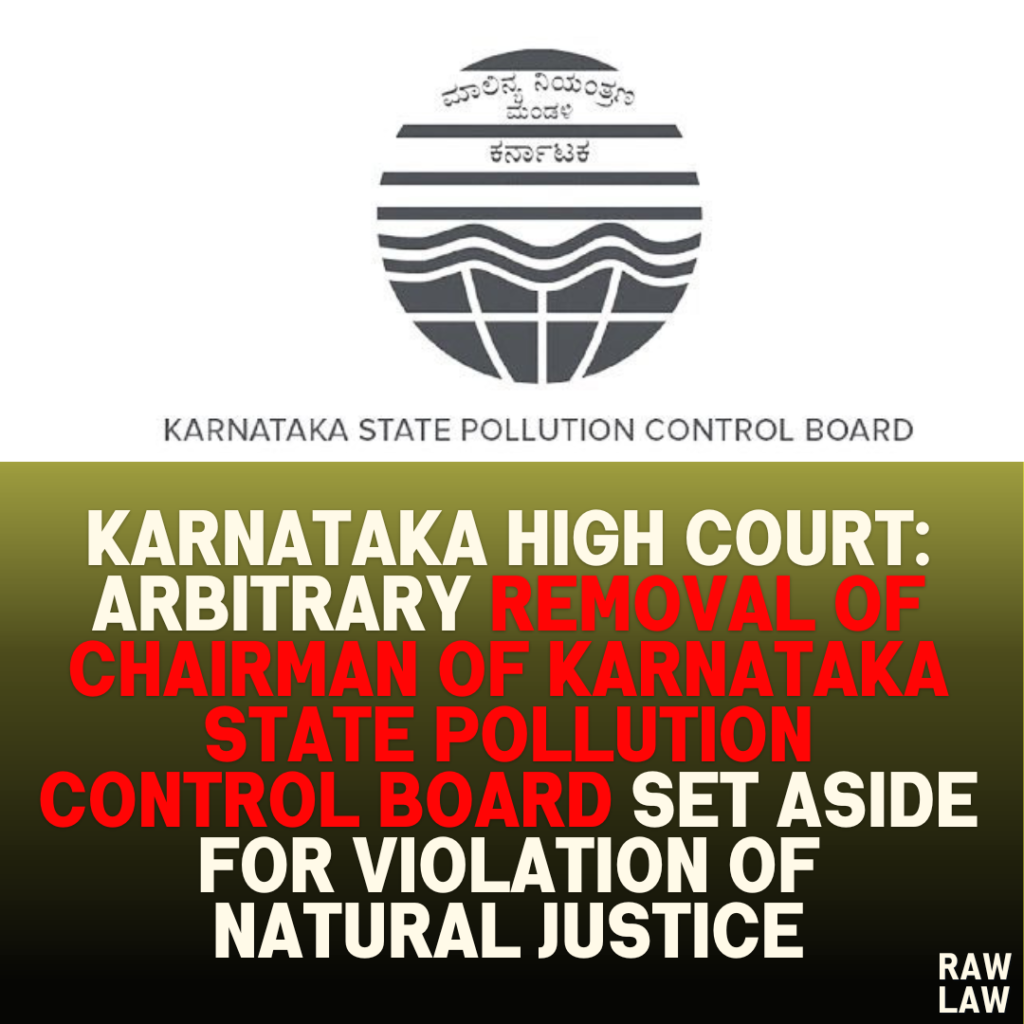Court’s Decision:
The Karnataka High Court set aside the order of the State Government disqualifying the petitioner from the post of Chairman and Member of the Karnataka State Pollution Control Board. The court held that the removal was arbitrary and violative of the principles of natural justice, as no charges were framed, and no opportunity for a personal hearing was provided. Consequently, the petitioner is to continue as Chairman and Member of the Board until the end of his tenure on November 14, 2024.
Facts:
- The petitioner was appointed as the Chairman of the Karnataka State Pollution Control Board (KSPCB) for a three-year term starting November 15, 2021, after being found the most eligible candidate by a Selection Committee chaired by the Chief Minister of Karnataka.
- After the formation of a new government in May 2023, a series of show cause notices were issued to the petitioner starting July 2023, alleging misconduct and irregularities in his functioning.
- In August 2023, a Corrigendum was issued curtailing the petitioner’s tenure, which was challenged in multiple writ petitions. The High Court had set aside the Corrigendum in November 2023, securing the petitioner’s tenure until November 2024.
- Despite the earlier court orders, the petitioner was issued fresh show cause notices and ultimately dismissed from his position on May 31, 2024, under Section 6(1)(g) of the Water (Prevention and Control of Pollution) Act, 1974.
Issues:
- Whether the removal of the petitioner from the position of Chairman of KSPCB violated the principles of natural justice.
- Whether the State Government’s actions in issuing multiple show cause notices and curtailing the petitioner’s tenure were legally valid.
- Whether the allegations against the petitioner were sufficient to invoke Section 6(1)(g) of the Water (Prevention and Control of Pollution) Act, 1974.
Petitioner’s Arguments:
- The petitioner contended that the removal was arbitrary, as he was not provided a reasonable opportunity to present his case.
- The show cause notices lacked specific charges, and no inquiry was conducted before passing the impugned order, violating the mandate of Section 6(2) of the Water Act.
- The petitioner argued that the action was a political vendetta following the change in government and was aimed at tarnishing his reputation.
Respondent’s Arguments:
- The State Government defended its actions, stating that the petitioner had abused his powers as Chairman and that the removal was justified under Section 6(1)(g) of the Water Act.
- The respondents argued that the petitioner had failed to act against erring officials and had misused his position in awarding tenders and appointing officers.
- It was submitted that there was no requirement for a full-fledged inquiry, as the opportunity to submit written replies satisfied the principles of natural justice.
Analysis of the Law:
- Principles of Natural Justice: The court reiterated that any action leading to civil consequences must comply with the principles of natural justice, including providing a reasonable opportunity for the affected person to defend themselves.
- Section 6(1)(g) of the Water Act: The section provides for disqualification of a member for “abusing” his position, but such abuse must be serious and intentional to justify removal. The court noted that the allegations against the petitioner did not establish such abuse.
- Reasonable Opportunity and Hearing: The court held that the requirement of a reasonable opportunity under Section 6(2) was not fulfilled, as the petitioner was not given a personal hearing, and the impugned order was based on allegations not detailed in the show cause notices.
Precedent Analysis:
The court relied on the Supreme Court judgments in S.L. Kapoor v. Jagmohan and UMC Technologies Pvt. Ltd. v. Food Corporation of India, which underscore the necessity of adhering to natural justice and ensuring that the actions taken do not go beyond the contents of the show cause notice.
Court’s Reasoning:
- The High Court noted that the series of show cause notices issued to the petitioner, along with the curtailment of his tenure, indicated a lack of procedural fairness and suggested a predetermined outcome.
- The impugned order dated May 31, 2024, was found to have been passed in violation of natural justice, as it contained new grounds that were not included in the show cause notices, thereby prejudicing the petitioner.
- The court emphasized that the petitioner’s alleged actions, such as appointment of officers and handling of tenders, were administrative decisions that did not amount to “abuse of power” as required under Section 6(1)(g).
Conclusion:
The High Court allowed the writ petition, setting aside the order of disqualification and dismissal. The petitioner was reinstated as Chairman and Member of KSPCB, with a direction that he shall continue in the position until the completion of his tenure on November 14, 2024.
Implications:
- This judgment reinforces the requirement for strict adherence to natural justice in administrative proceedings, particularly when actions are taken against statutory officeholders.
- It underscores that changes in political regimes should not lead to arbitrary dismissals of officers without following the due process of law.
- The judgment sets a precedent that disqualifications and removals under statutory provisions must be based on concrete evidence of abuse of power and not on administrative decisions that can be subject to differing interpretations.
